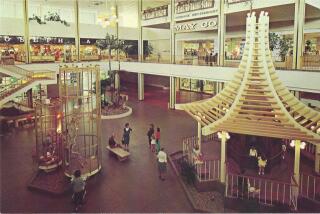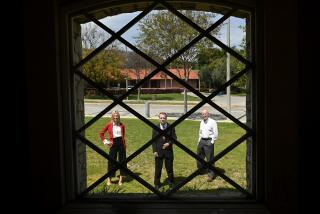Tianguis Market to Anchor Complex : Work Starts on Cudahy’s Disputed Shopping Center
- Share via
CUDAHY — Construction began last week on a controversial $10.2-million shopping center that officials hope will revitalize the most conspicuous street corner in this impoverished, mile-square city.
For more than a year, the 7.7-acre site on the southeast corner of Florence Avenue and Atlantic Boulevard had been mired in a legal dispute that had half a dozen property owners contesting the city’s right to take their land.
For the record:
12:00 a.m. Dec. 27, 1987 For the Record
Los Angeles Times Sunday December 27, 1987 Home Edition Long Beach Part 9 Page 4 Column 1 Zones Desk 2 inches; 56 words Type of Material: Correction
An article in the Dec. 13 Southeast/Long Beach editions incorrectly reported the amount of tax that Cudahy would have received from a proposed card club that was rejected last February by the City Council. The article should have stated that under current law the club’s projected $2-million monthly gross income would have been taxed from 7% to 10%, with a minimum monthly payment to the city of $10,000.
But last April, a Superior Court judge ruled that city officials could indeed exercise eminent domain in return for paying the owners a fair price, even if it meant displacing a blind man and a church.
Cudahy has since paid six of the property owners--city officials couldn’t provide the exact amount last week--while six others are still negotiating. Two of them--businessman Ted Burkett, who is legally blind, and estate executor Harry Ulman--say they intend to file court appeals, according to attorney Donald Drew.
Offer to Settle
Earlier this year, Ulman offered to settle his part of the litigation if city officials dropped the shopping center plan and let him open a card club on the site through a tenant he declined to identify. The offer was rejected, however, by the City Council.
Ulman couldn’t be reached for comment last week.
“You don’t condemn a church to put in a gambling casino; you just don’t do that,” said Mayor Pro Tem Wilfred Colon. “They’ll run you out of town on a rail.”
So, Costa Mesa developers DSL Service Co. have begun preparing the vacant site for construction of the 83,000-square-foot shopping center, scheduled to open next summer. It will be anchored by a 50,000-square-foot grocery designed to cater to the city’s predominantly Latino population.
The Tianguis Market, a division of the Vons Co., will offer a variety of Latin American foods along with regular grocery items. Vons operates one other such market, in Montebello, division general manager Chris Linskey said.
“We’ve just tailored the merchandise mix in that store to . . . Hispanic preferences,” he said. Accompanying the Tianguis Market will be restaurants as well as stores dealing in soft goods such as clothes, shoes and videos.
Need More Tenants
Joan Jacoby, a project manager for DSL, said the developers have not yet found tenants to lease all of the shopping center space.
The shopping center plan was born in 1983, when city officials began trying to find a major grocery to replace a Boys’ Market that had formerly shared the site as the only supermarket within the city limits. (Another supermarket lies just across the street from the Cudahy site, but that store is technically in the city of Bell). DSL agreed to act as developer, and the project was financed in part with a $1.5-million federal grant and $7.8 million in industrial development bonds issued by the city.
When the city approached the property owners with offers to buy their land, several refused and went to court. They argued that the council members--as directors of the Redevelopment Agency--had effectively “pre-committed” to sell the site to the shopping center developer before proper notice had been given to them.
A judge ultimately ruled in favor of the city, but not before the card club proposal had been made by Ulman, executor of his late brother Charles’ estate and owner of the former Boys’ Market building.
In a Jan. 29 letter, Ulman’s attorney wrote that Ulman would drop his legal action if the city agreed to let him open a card club.
An extensive proposal attached to the letter estimated that the $5.2-million, 50-table casino would bring the city about $469,500 a month in taxes. It would include a restaurant, a coffee shop and a cocktail lounge and would employ 800 people.
The proposal said that “the senior general manager of this project shall be nameless at this time, due to other commitments” but that “he has over 30 years’ experience as owner and general manager of casino operations.” The names of club investors were also kept confidential.
Vote to Reject
But the City Council voted unanimously to reject the proposal.
“There’s such a proliferation of those things (clubs) here that even though it’s a prime location it’s still going to have trouble competing with the Bicycle Club (in Bell Gardens) when the Bicycle Club is 10 feet off the freeway,” said Councilman Tom Thurman.
The $1.5-million federal grant--a critical part of the shopping center funding--was also designed for that specific type of development, Thurman said.
In 1983, Cudahy issued its only card-club operating license to real estate developer Charles King. But he has had only limited success in establishing his Silver Saddle casino. At the moment, it is closed.
More to Read
Sign up for Essential California
The most important California stories and recommendations in your inbox every morning.
You may occasionally receive promotional content from the Los Angeles Times.













